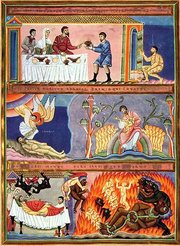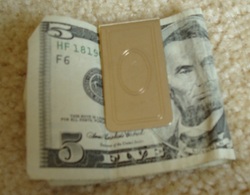 Was it more than just silver? Then Judas Iscariot, who was one of the twelve, went to the chief priests in order to betray him to them. And when they heard it, they were glad and promised to give him money. And he sought an opportunity to betray him. (Mark 14:10-11) There has been much speculation regarding Judas' motives in betraying Jesus, but in the end they are just that speculation. The only reasons the Gospels record are those of greed.
1 Comment
 "And everyone who has left houses or brothers or sisters or father or mother or children or lands, for my name's sake, will receive a hundredfold and will inherit eternal life. But many who are first will be last, and the last first. For the kingdom of heaven is like...” (Matthew 19:29-20:1a) It has become common knowledge that God will bless people 100 times over (or with “100% interest”) for what they sacrifice for the sake of the Kingdom. However, because this parable has been lifted from the context of Jesus' larger teaching (since Jesus is the most misquoted person in history), people have used it to support their worldly inspired visions of a material heaven.  Codex Aureus of Echternach “The poor man [Lazerus] died and was carried by the angels to Abraham's side. The rich man also died and was buried, and in Hades, being in torment, he lifted up his eyes and saw Abraham far off and Lazarus at his side.” (Luke 16:22-23) While the story of Lazerus and the rich man is a parable, that doesn't negate the Truth elements depicted in it. Jesus is never known to fabricate or repeat myths even in his parabolic storytelling. Thus, even if the events described didn't happen historically (though Lazerus is the only named character in a parable), the  "One who is faithful in a very little is also faithful in much, and one who is dishonest in a very little is also dishonest in much. If then you have not been faithful in the unrighteous wealth, who will entrust to you the true riches? And if you have not been faithful in that which is another's, who will give you that which is your own? No servant can serve two masters, for either he will hate the one and love the other, or he will be devoted to the one and despise the other. You cannot serve God and money." (Luke 16:10-13). Trust with riches & relationships are earned. It's amazing how many people misinterpret this passage for Jesus' teaching here isn't rocket science.  “do you not know that your body is a temple of the Holy Spirit within you, whom you have from God? You are not your own, for you were bought with a price. So glorify God in your body. (1Corinthians 6:19-20) Paul outlined that God not only created us, but bought us back from the life of sin we chose over Him. While Paul is explicitly speaking of our physical bodies, it would seem natural to extend such a philosophy of indebtedness to every aspect of our lives, for if our own bodies are not our own, how much more so the skills and knowledge He gave us? The families and friends that bless us? The jobs and wealth that He has granted us? Should we not see ourselves as nothing more than stewards when it comes to every aspect of our lives? In this regard, we need to act more like the shrewd manager, that is thinking of my future, my eternal future. Each day we should be waking up and asking, how can we use these possessions and qualities that we've been granted authority over to impact my true home, the eternal Kingdom. Whether it be money, time, or talents, investing them back into the Kingdom from which they came, and to which we will live in for eternity, is the most logical approach.  Lead with a towel When he [Jesus] had finished washing their feet, he put on his clothes and returned to his place. “Do you understand what I have done for you?” he asked them. “You call me ‘Teacher’ and ‘Lord,’ and rightly so, for that is what I am. Now that I, your Lord and Teacher, have washed your feet, you also should wash one another’s feet. I have set you an example that you should do as I have done for you. Very truly I tell you, no servant is greater than his master, nor is a messenger greater than the one who sent him. Now that you know these things, you will be blessed if you do them. (John 13:12-17) During the Upper Room Discourse (the Last Supper), Jesus gave his disciples final teachings to to prepare them for leadership in his physical* absence. Here Jesus delivers one of the most memorable lessons on humility and leadership. God incarnate took the position of a servant/slave and washed the gritty sandaled feet of 12 sweaty men who'd been walking all day. In Luke's account of the Last Supper (Luke 22:7-38) he tells that once again the 12 disciples began to dispute who among them was to be considered the greatest (v24). Jesus then spells out the upside down kingdom again (just as in Matthew 18:1-9) by revealing that the one who rules is the one who serves, just as Christ served them.  What are our true priorities? We can tell by when and how often our wallets make an appearance. These statistics were printed in a November 2010 church bulletin at Fellowship Bible Church in Roswell, Georgia. They speak for themselves. U.S. Spending per year Cars - $600,000,000,000 Xmas gifts - $250,000,000,000 Fast Food - $110,000,000,000 Ice Cream - $20,000,000,000 Weight Loss - $33,000,000,000 Missions - $39,000,000 Global Needs for every man, woman, and child Basic Education - $6,000,000,000 Water/Sanitation - $9,000,000,000 Basic Health - $13,000,000,000 The basic humanitarian needs of the world could be met if Americans would be less selfish in one area by spending: 5% less on Cars 12% less on Xmas Gifts 22% less on Fast Food and Ice Cream The money saved on weight loss products would more than cover the world's need. Are we being good stewards of what we've been given? |
AuthorBrett Yardley: Categories
All
Archives
January 2019
|

